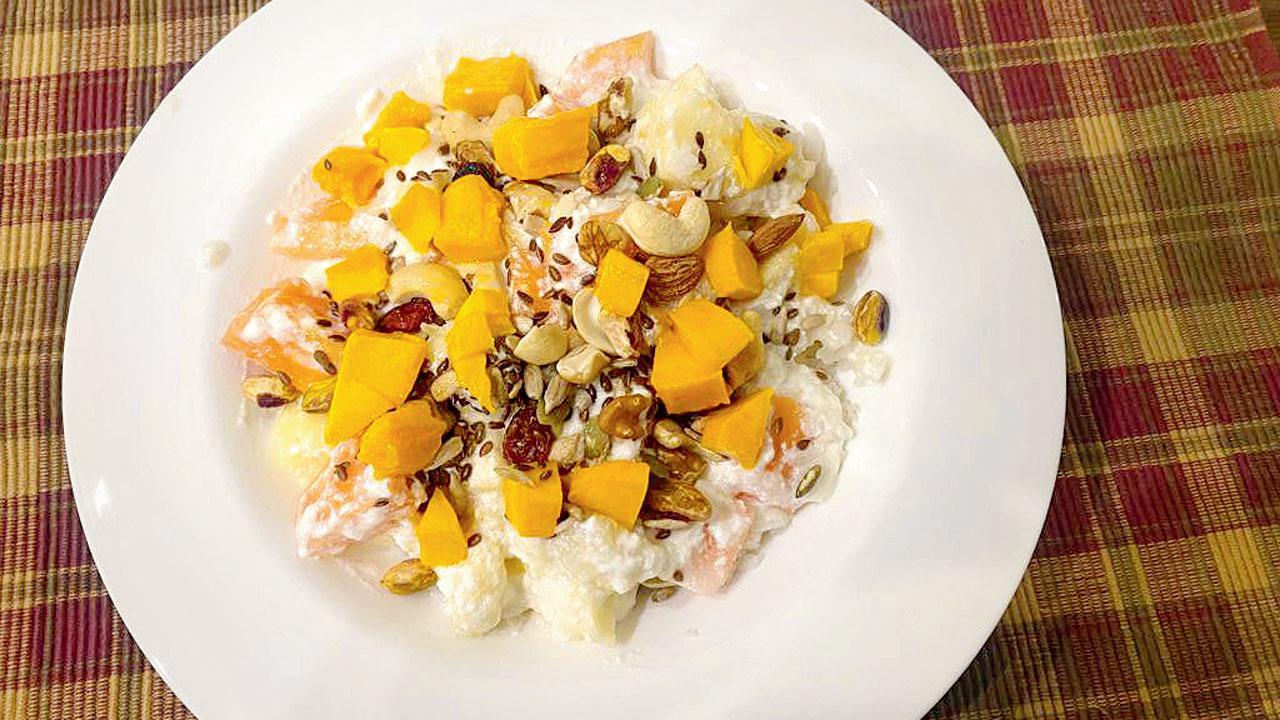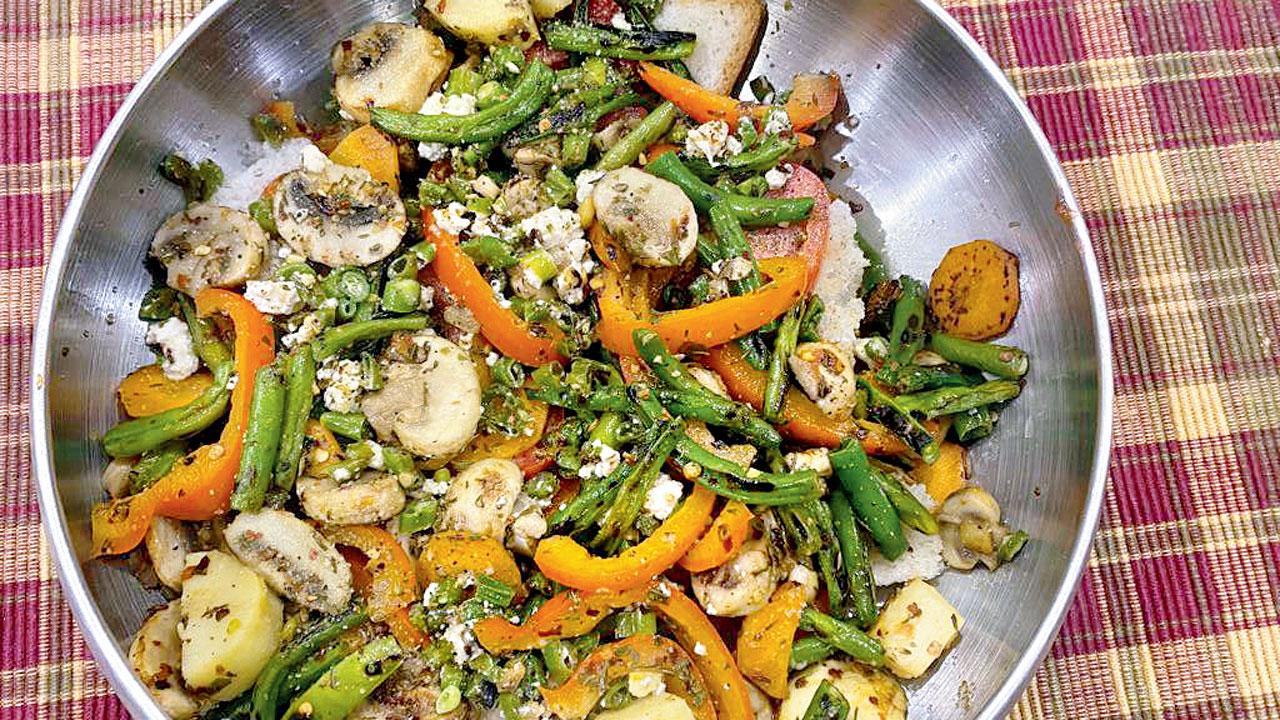Packed with quick, easy and delicious recipes, this new cookbook makes healthy eating seem like a breeze

Representation Pic
Imagine braving traffic, delayed trains and humid weather to reach home at 8 pm after a long day at work—making dinner is the last thing on your mind. Even if you are extremely hungry, the thought of kneading the dough to make rotis or to cut, peel, chop and cook veggies can leave you overwhelmed. Ordering food comes with its own share of guilt. That’s why nutritionist and author Kavita Devgan came up with 500 Easy, Delicious, Healthy Recipes: Simple Tricks for Stress-Free Cooking (Rupa Publications; Rs 319). It is packed with recipes and simple tricks for stress-free cooking. An atypical cookbook, it reflects Devgan’s belief in prepping rather than slaving away over the stove for hours.
ADVERTISEMENT
“Most of us in India believe that good cooking is about the time we spend making a dish, that’s not necessarily true,” she says over a call from Noida. “Ordering or eating out may seem like the easiest way out but it has serious health repercussions. The quality of ingredients and therefore the nutrition is sub-par to say the least, and as a result, we see so many health issues crop up.”

Divided by types of foods and core ingredients—grains, lentils, proteins, vegetables, fruits, healthy sweets and snacks—it has interesting bonus sections like Breakfast for Singles, Reusing Peels and Stems, and Guilt-free Festival Snacks and Sweets. During her 23 years of practising as a nutritionist, she observed that most Indians lack the concept of food and grain rotation, “We cannot have bread for breakfast and rotis for lunch and dinner. We must learn how to rotate foods. We are obsessed with eating rotis which is not a wholesome diet,” she adds. She highlights that you don’t have to Convert bajra into rotis every time you buy the grain, think pongal—made in under 20 minutes—and you have a new way to introduce the nutrient in your body.
The bajra pongal recipe involves dry-roasting broken bajra and pressure cooking it with green gram dal and salt for up to three whistles on low heat. For a tadka, shallow-fry cashews in ghee, add cumin, curry leaves and ginger paste and splash over the pongal. “Have this with homemade buttermilk and you have a wholesome meal in minutes. If you’ve pre-roasted the bajra, you save some more time,” she confides.
Another recipe we loved was the warm bread and vegetable salad in the Quick Working Lunch section. Just tear a slice of bread and place it in a large salad bowl, tossing in sliced tomatoes, salt, pepper and a dash of lime juice. Let sit for five minutes.
Meanwhile, saute garlic, followed by sliced carrots and French beans till tender and charred. Add mushrooms and red pepper, cook for a few more minutes, season and add to the bread bowl. Sprinkle cheese and herbs and you have a hearty bowl. “It’s important to know how much cooking time you have in your busy schedule and plan the meal according to it and not the other way round,” is her pro tip.

Kavita Devgan
The book is also interspersed with stories from chefs such as Manish Mehrotra and Olympic Javelin winner Neeraj Chopra—he recounts his childhood memory of eating spinach freshly plucked from the fields in his village of Khandra Panipat, Haryana. “I remember its fresh, delicious taste. When I visit my village now, I ensure I eat lots of dishes made with palak for sure. These are really close to my heart,” he narrates in the book.
“Spinach has oodles of vitamin K, calcium, and magnesium, and is best consumed raw, but to make it palatable, it can be made into a smoothie by blending baby spinach, an orange, with a pinch of cinnamon and coconut water or coconut milk,” says Devgan. Just add a little honey before gulping it down.
Another dish we liked was a Bengali breakfast of phal aahar. The hero of the dish is chivda (flattened rice), which needs to be washed and drained and set aside for 15 minutes. Chop a cup of assorted fruits—whatever is available in the fridge—and mix them with nuts and a cup of curd. Ginger and jaggery are optional but they pack a punch. The dish is all you need to start your day and is so much better than store-bought cornflakes.
Devgan maintains that some classic recipes will never go out of style but we must use the old ingredients and experiment with our food to add variety. “After all, what is life but eating good, nutritious food that nourishes our body and soul,” she asks.
Tips from the author
£ Keep boiled eggs and chickpea handy in the fridge to quickly toss in a dose of protein to salads.
£ Roast and store pumpkin seeds for that extra crunch
£ Curd is versatile; make raita of it as an accompaniment to your main course, or just add fruits and nuts for a mid-day meal
 Subscribe today by clicking the link and stay updated with the latest news!" Click here!
Subscribe today by clicking the link and stay updated with the latest news!" Click here!







